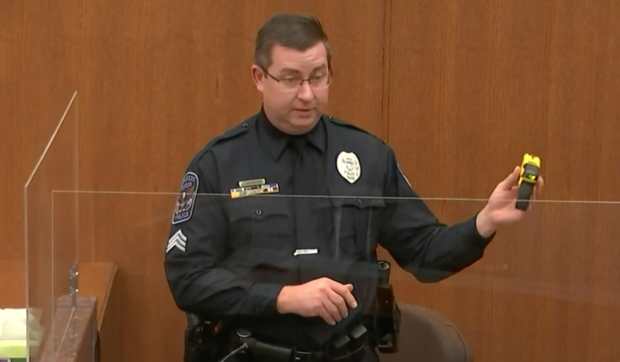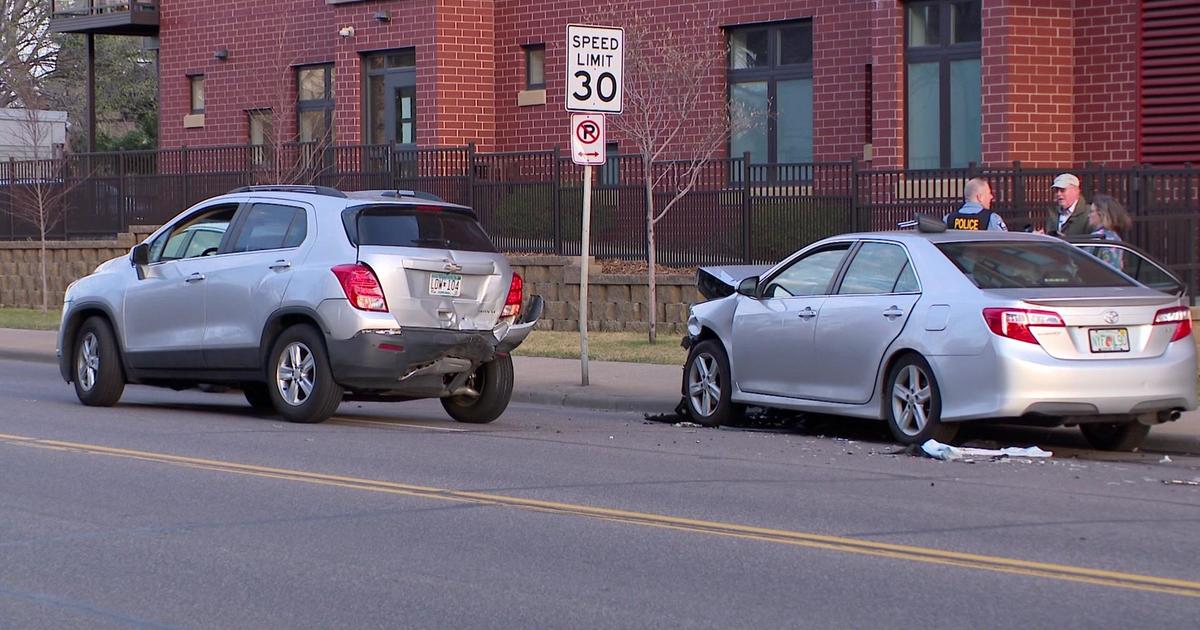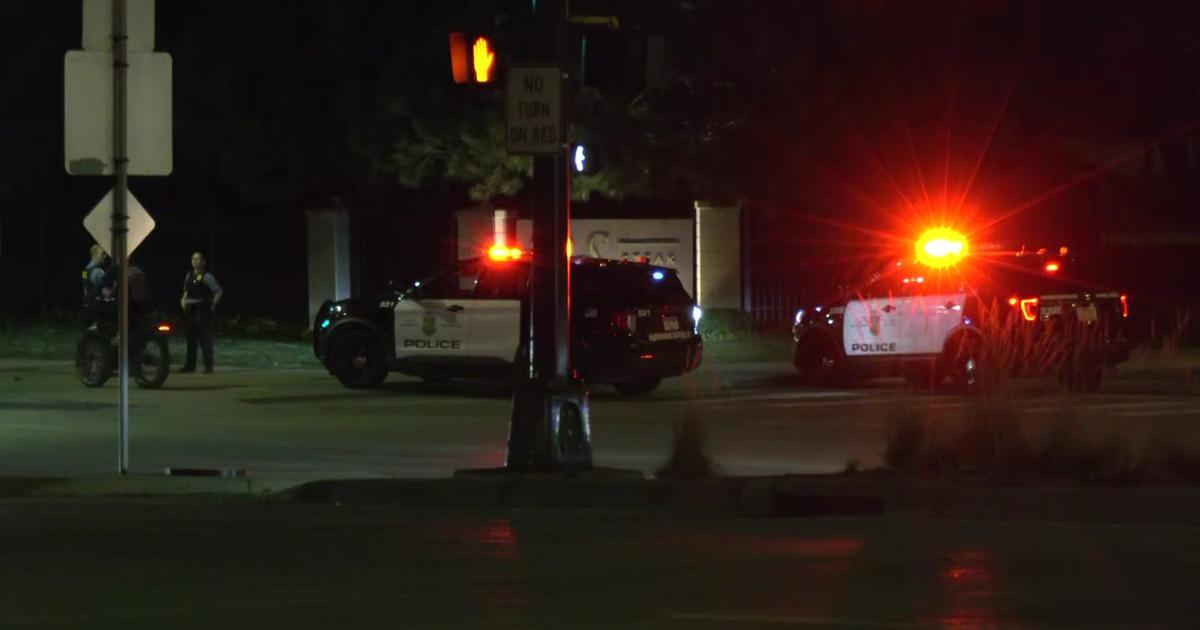Kim Potter Trial, Dec. 14: BCPD Use-Of-Force Instructor Testifies On Department's Taser Training
MINNEAPOLIS (WCCO) - After a flurry of witnesses Monday, only two took the stand Tuesday in the Kim Potter trial.
Brooklyn Center Police Commander Garett Flesland, who has known Potter for more than 20 years and briefly was her supervisor, said "she's a good cop, she's a good person, she's a friend."
State prosecutor Matt Frank interrupted Flesland before he could continue, but Judge Regina Chu let the answer stay on the record.
Frank spent his time questioning Flesland on Brooklyn Center Police Department policies and the extensive training Potter received.
Flesland demonstrated to the jury how he wore his Taser, then the prosecutor showed several pictures of Potter through the years, always wearing hers the same way.
Defense Attorney Earl Gray immediately tried to undermine the questions about Potter's training on cross examination, arguing that training isn't like real life.
Gray asked Flesland about police use-of-force in hypothetical situations, trying to evoke the situation with Potter and Wright. Gray looked pleased when Flesland later said he was thinking about that incident when saying that using force would be reasonable.
During the series of hypothetical questions on using force, the state objected many times, but Chu almost always overruled.
In the afternoon, the state called Brooklyn Center Sgt. Mike Peterson to the stand, a use-of-force instructor, who testified that Potter had passed the latest Taser training just six weeks before she shot and killed Wright.
The prosecution then spent a lot of time talking through the user's manual for the Taser, including several warnings in the manual that users shouldn't deploy the Taser on anybody operating a motor vehicle.
Peterson also testified that during training, officers are put through life-like situations, in a move by the prosecution which seemed to undermine Gray's earlier comments about how training is not life-like.
MINNEAPOLIS (WCCO) -- Testimony will continue Tuesday in the trial of former Brooklyn Center police officer Kim Potter, but first the judge is expected to rule on two key motions.
Potter is charged with manslaughter in the death of Daunte Wright, whom she fatally shot during a traffic stop in April. She says she meant to use her Taser, not her gun.
Below are updates, beginning with the latest.
------
UPDATE (4:28 p.m.): Judge Regina Chu dismissed jurors for the day following testimony from Brooklyn Park Sgt. Mike Peterson.
In the hour or so following the afternoon break, Attorney Matthew Frank asked Peterson about the details of Taser training and the updated Taser 7 model, which Brooklyn Center started using last year.
Frank showed documents that confirmed Potter completed the Taser 7 training on March 2 of 2021, a little over a month before she fatally shot Daunte Wright. He also showed that Potter completed Peace Officer Standards and Training Board use-of-force training every year between 2016 and 2020.
In the end, Frank asked Peterson if he, in his years at Brooklyn Center, was aware of any officers who pulled a firearm instead of a Taser. Peterson says he doesn't know of any circumstance, in training or in practice.
UPDATE (3 p.m.): The state calls Sgt. Mike Peterson to the stand, a 16-year veteran with the Brooklyn Center Police Department.
Peterson became a use-of-force instructor in 2007, and is a certified Taser instructor for the police department. Attorney Matthew Frank asks him about use-of-force instruction and "scenario-based" training, in which officers are placed in situations that are as life-like as possible, to help them think through an array of solutions.
Frank then moves on to showing warnings and Taser materials from Axon, a company which creates the Tasers used by Brooklyn Center. He highlights a portion of the training material which says Tasers should not be used on a person operating or riding a motor vehicle.
Frank also asks about the possibility of confusing a handgun with a Taser, and if it's a "topic that is taught and paid attention to." Peterson agrees that it is.
As questioning continues, Peterson explains that Brooklyn Center's Taser policy dictates that an officer must carry their Taser on the opposite side of the body that the firearm, and the Taser is yellow, in order to distinguish it from the handgun.
Frank then asks Peterson to demonstrate the Taser spark function test in court. On Monday, BCA Senior Special Agent Sam McGinnis testified that Potter did not do a function test of her Taser on April 11.
Then, Frank walks through Brooklyn Center's department policy on Tasers. He points out a portion of the policy, which reads "mere flight from a pursuing officer, without other known circumstances or factors, is not good cause for the use of the TASER device to apprehend an individual." The policy does say that a Taser can be used against someone who is violent or resisting.
Shortly before the afternoon break, Judge Regina Chu asked Peterson to stop speaking so everyone could stand up and stretch, as one of the jurors was falling asleep.
UPDATE (12:30 p.m.): During cross-examination, defense attorney Earl Gray asked follow-up questions about Kim Potter's Taser training.
Brooklyn Center Police Department Cmdr. Garett Flesland said he doesn't believe she missed any training, and that she took the training seriously.
Gray then ran Flesland through a series of quickfire questions about when use of force, including deadly use of force, is permitted. The questions were ostensibly hypothetical but echoed the details of Daunte Wright's shooting during the April 11 traffic stop.
Gray asked if deadly force is reasonable if an officer may potentially be dragged by a vehicle. Flesland said it's "potentially" reasonable, and says he wasn't there on April 11, but agrees.
The defense asked Flesland how he would characterize Potter as an officer.
"She's a good cop. She's a good person. She's a friend," Flesland said.
The state objected to the question, and Chu sustained the objection, but let the answer stand.
The defense asked Flesland a question about going to Potter's house after hearing she had hurt herself. The state objected, and Chu sustained it. The jury was instructed to disregard the answer.
On redirect, the state asked Flesland if his answers to the use of force questions were based on Gray's characterization of the situation. He agreed.
The jury has been excused for a lunch break.
UPDATE (12 p.m.): The state has finished questioning Brooklyn Center Police Department Cmdr. Garett Flesland, and the defense will now cross-examine.
The prosecution spent most of the time after the morning break questioning Flesland about Brooklyn Center's Taser policies and training.
Flesland testified that training is required for officers to carry a Taser, and that officers are required to perform a "spark test" with their Taser before each shift.
The state showed multiple documents verifying Potter was certified and repeatedly re-certified to carry a Taser.
The state also showed multiple still images of how Potter holstered her Taser while on-duty. In those images, she carried it on her left side in what's called the "reaction draw" position, meaning the Taser's handle is pointing backward.
UPDATE (11:20 a.m.): Judge Regina Chu said that, if Kim Potter is convicted, there will be a separate trial for Blakely, or aggravated sentencing, factors.
This was discussed in court during the jury's morning break. Prosecutor Matthew Frank said this was previously discussed in chambers, and his recollection was that the defense agreed to a unitary trial. In court Tuesday, however, Potter and the defense team said they prefer a bifurcated trial.
UPDATE (10:45 a.m.): The jury is excused for a 20-minute break as Judge Regina Chu and counsel discuss Blakely, or aggravated sentencing, issues.
Before the break, the state continued to question Brooklyn Center Police Department Cmdr. Garett Flesland about department policies.
Prosecutor Matthew Frank asked Flesland to read parts of the department handbook, including policies regarding use of force, firearms and when to both initiate and terminate pursuits.
Frank specifically asked about the department's policies about firing at moving vehicles, which Flesland acknowledged is discouraged but not outright prohibited.
As Frank asked Flesland about the policies, he also asked the commander to confirm whether and when Kim Potter acknowledged those policies, as officers are required to do.
UPDATE (10:15 a.m.): The state's first witness of the day is Cmdr. Garett Flesland of the Brooklyn Center Police Department.
Flesland said he's known Kim Potter since he joined the department in 2000, and has acted as her supervisor "for a few brief periods."
The state's questioning mostly concerned BCPD policies and training. Prosecutor Matthew Frank asked Flesland to read certain lines of the department's Code of Ethics and explain what those lines mean to him.
He said when he puts on the badge in the morning, it's a reminder that he's sworn to serve and protect the public.
UPDATE (9:20 a.m.): Judge Regina Chu has also denied the state's motion to limit the opinion of witnesses who are not testifying as experts.
UPDATE (9:15 a.m.): Judge Regina Chu has denied the state's motion to permit questions about police officers' union membership as a way to determine bias.
Prosecutor Matthew Frank said the state's intention was "not to cast aspersions, of course, on unions," but was about "the context of this case."
"The specific context here is a union that provides services and defense for its members when they are questioned about their job performance, and those are very serious matters," Frank said. "That sort of defense, that assistance is a little bit different than a lot of unions."
"There's no showing of bias and the individuals they're concerned about weren't in the union anyway," defense attorney Paul Engh offered in rebuttal.
Chu ruled questions about union membership were not relevant to show bias and denied the motion.
UPDATE (7 a.m.): The state filed two motions Monday. One seeks to limit the opinion of witnesses who are not testifying as experts. The other seeks permission to question police officers about union membership as a way to determine bias.
READ MORE: Public Employees Association Opposes State's Motion To Question Officers About Union Membership
Potter served as union president in Brooklyn Center. Prosecutors argue her elevated status gives her a level of respect and admiration that makes fellow union officers biased in her favor.
That motion is getting some pushback from the Minnesota Public Employees Association. The organization released a statement denouncing the motion and noting the Hennepin County Attorney's Office is unionized.
Tuesday will mark the fifth day of testimony in Potter's trial. On Monday, the jury heard from an assistant medical examiner and multiple Bureau of Criminal Apprehension employees.
READ MORE: Kim Potter Trial, Dec. 13: Jury Presented With Technical Testimonies On Tasers, Guns
The man who performed Wright's autopsy, Dr. Lorren Jackson of the Hennepin County Medical Examiner's Office, established Wright's cause of death: a gunshot wound to the chest.
BCA agent Sam McGinnis testified to the differences between a Taser and a Glock pistol, which Potter says she mistook for each other when she shot Wright.
The prosecution pointed out the weight difference in the weapons. Potter's lawyers pointed out the similarities, including the trigger mechanisms and general shape of both weapons.




